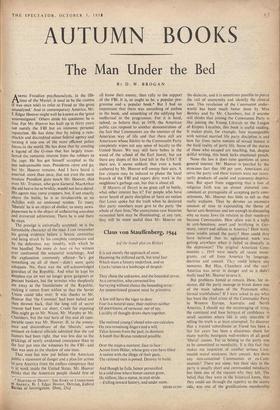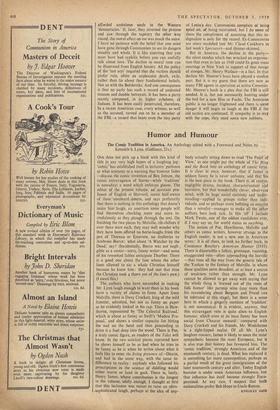AUTUMN BOOKS
The Man Under the Bed
By D. W. BROGAN AMONG -Freudian psychoanalysts, in the life-
time of the Muster, it used to be the custom (I was once told) to refer to Freud as 'the great unanalysed.' And•in contemporary America, Mr. J. Edgar Hoover might well be known as the great uninvestigated.' Others abide his questions; he is free. For Mr. Hoover has built up in thirty years not merely the FBI but an immense personal reputation. He has done that by taking a ram- shackle and discredited minor federal agency and turning it into one of the most efficient police forces in the world. He has done that by creating a legend of the G-man that has largely trans- ferred the romantic interest from the robbers to the cops. He has got himself accepted as the one indispensable man. Presidents come and go, but Mr. Hoover remains; And I have heard it asserted, more than once, that not even the most resolute President dare touch Mr. Hoover, that even Mr. Truman, who gave General MacArthur the old heave-ho so briskly, would not have dared. His agents may come croppers, but, if not exactly above the battle, he is as invulnerable. as an AebilleS with no undoused tendon. To many `liberals' he is an object of dislike; to many news- papermen he is the object of unflattering anecdote' and irreverent admiration. There he is and there he stays. •
The prestige is universally accepted; so is the formidable character of the man. I can remember his giving evidence before a Senate committee and being struck by his complete composure and by the deference, nay timidity, with which he Was handled. No more de hart en has witness ever confronted the senatorial watchdogs, And the explanation commonly offered—'he's got something, on all of them'—didn't seem. quite adequate. No, there was the self-acknowledged guardian of the Republic. And what he kept his sleepless eye on was no longer great gangsters or peccant bankers, but the termites who sleeplessly ate, away at the foundations of the Republic, making it rotten from within so that the Soviet Union could take over.- It was thanks to Mr., Hoover that 'the Commies' had been halted and then thrown back, that the long roll of secret treason had been cut short. Credit for exposing Hiss might go to Mr. Nixon, Mr. Murphy or Mr. Chambers, but the real herb of this and all com- parable cases was Mr. Hoover. If, to the annoy- ance and 'discomfiture of the 'liberals,' some eminent ex-federal officials admitted that the red hunters had been right, that was less due to the prickings of newly awakened conscience than to the fear put into the witnesses by the FBI--and that was seen as the, shadow of one man.
That man has now put before the American public a statement of danger and a plan for action to save America from the endless conspiracy that is at work inside the United States. Mr. Hoover thinks that the American people should first of.
* MASTERS OF DECEIT: THE STORY OF COMMUNISM IN AMERICA. By J. Edgar Hoover, Director, Federal Bureau of Investigation. (Dent, 25s.) all know their enemy, then rally to the support of the FBI. It is, or ought to be, a popular pro- gramme and a popular book.* But I had an impression that there was something of pathos in the book, and something of the edifying but ineffectual in the programme. -For it is hard, indeed, to believe that, in 1958, the American public can respond to another demonstration of the fact that Communists are the enemies of the American way of life and that there still are Americans whose fidelity to the Communist Party completely wipes out any sense of loyalty to the United States. We may still have babes in the wood of the school of the Earl Jowitt, but are there any dupes of this kind left in the USA? If there are, it seems unlikely that even a book authored by Mr. Hoover will unstop their ears. A few citizens may be induced to phone the local branch of the FBI and report dirty work in the neighbour's garbage can, but that is about all.
' If Masters of Deceit is no great call to battle, what other interest has it? For people who have never heard of party discipline or have no notion that Lenin spoke but the truth when he declared that party members must give to the party 'the whole of their lives,' the anonymous case histories recounted here may be illuminating; at any rate, they will be more useful' than Mr. Hoover on
the dialectic, and it is sometimes possible to pierce the veil. of anonymity and identify the clinical case. This revelation of the Communist under- world has been much better done by Miss Bentley and by Mr. Chambers, but if anyone still thinks • that joining . the Communist Party is like joining the Young 'Liberals or the League of Empire Loyalists, this book is useful reading. It makes plain, for example, how incompatible with normal married life party discipline is and how far from naive notions of sexual licence is the hard -reality of party .life. Some of the stories of those who escaped are touching, but, despite skilful writing, this book lacks emotional punch.
None the Jess it does raise questions of some general interest. -M r. Hoover -is-puzzled by the atrocious fact that .100 per cent; Americans did serve the party' and these traitors were not neces- sarily products of social and economic •depriya- tion. But apart from suggesting that a loss of religious faith was an. almost universal con- comitant or prerequisite of accepting party com- mitments, Mr. .Hoover has little to tell us that really . explains. ThuS he, devotes an excessive amount of time to expounding the theme of Soviet anti-Semitism and not enough to discussing why so many Jews (in relation to their numbers) became Communists. How often was it a reply to anti-Semitism, overt and terrifying in Ger- many, covert and odious in America? How many mere misfits joined the party? How could they have believed that its agitational work' was getting anywhere when it failed so dismally in the depression? The original American Com- munists e. 1919 were nearly all recent immi- grants, cut off from America by language, doctrine .and conceit. They could believe any nonsense. But Hiss, Chambers and the rest? America was never in danger and 'so it didn't really need Mr. Hoover to save it.
But problems hinted at :remain. How, for in- stance, did the party manage to -break: down one of the .main taboos .of the Protestant ethic, formal truthfulness? If I were asked to say what has been the chief crime of the CommuniSt Party in Western Europe, Australia and North America, I should say the encouraging of lying, the continual and base betrayal. of confidence in small societies where life is only :tolerable if telling the truth is at least attempted, To discover that a trusted subordinate or friend has been a liar for years has been a disastrous shock for many worthy bourgeois well-wishers of all good 'liberal' causes. Yet to belong to the party was to be committed to mendacity. It is this fact that makes me impatient of another serious 'Com- munist moral weakness, their conceit. Are there any non-conceited ComMunists or ex-Com- inunists? There are some. but -their stay in the party is usually short and commanded mendacity has been one of the reasons why they left. The belief that they were in the historical know, that they could see through the tapeStry to the seamy side, was one of the gratitica•tions membership
afforded ambitious souls in the Western `democracies.' If, later, they reversed the process and saw through the tapestry the other way round, the moral effect on me was much the same. I have no patience with the belief that you must have gone through Communism to see its dangers steadily and whole. It is like asserting that you must have had syphilis before you can usefully talk about love. The decline in moral tone can be illustrated from English history. All the policy of the 'test acts' required that .the victims should prefer ruin, often an unpleasant death, exile, rather than lie about their fundamental beliefs. Not so with the Bolsheviks. And one consequence is that no party has such a record of undenied treason and double betrayals. It has been a party mainly composed, in its higher echelons, of Judases. It has been easily penetrated, therefore. In a recent American case, every witness, as well as the accused, turned out to be a member of the FBI---a record that beats even the tiny party of Lenin's day. Communists complain of being spied on, of being mistrusted, but I do some of them the compliment of assuming that this in- dignation is only for the record. Ex-Communists are more muddled (see Mr. Claud Cockburn in last week's Spectator)—and thinner-skinned.
But in America, the decline in the party— the silent exodus which has wrecked an organisa- tion that even as late as 1948 could fix great mass meetings in New York in support of that stooge of stooges, Mr. Henry Wallace—is a fact. In that decline Mr. Hoover's boys have played a modest part. But it is my guess that there are now as many FBI agents in operation as active Commies. Mr. Hoover's book is a plea that the FBI is still needed. It is, but not necessarily hunting under the bed for a new Hiss or Fuchs. The American public is no longer frightened and there is some danger it will .begin to laugh at the FBI if the old tactics are continued. If sympathy is to stay with the cops, they need some new robbers.



















































 Previous page
Previous page